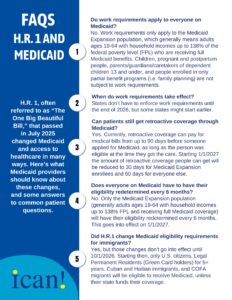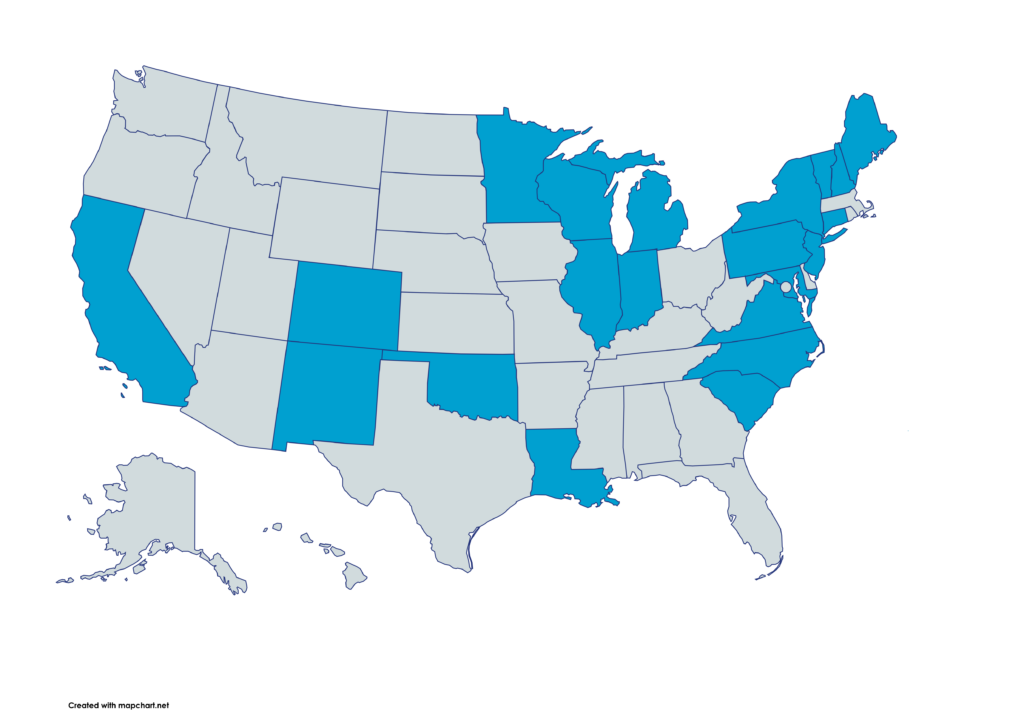Medicaid after Trump’s “Big Beautiful Bill:” What’s Changing?

H.R. 1, often referred to as “The One Big Beautiful Bill,” that passed in July 2025 changed Medicaid and access to healthcare in many ways. Here’s what Medicaid providers should know about these changes, and some answers to common patient questions.
1. Do work requirements apply to everyone on Medicaid?
No. Work requirements only apply to the Medicaid Expansion population, which generally means adults ages 19-64 with household incomes up to 138% of the federal poverty level (FPL) who are receiving full Medicaid benefits. Children, pregnant and postpartum people, parents/guardians/caretakers of dependent children 13 and under, and people enrolled in only partial benefit programs (i.e. family planning) are not subject to work requirements.
2. When do work requirements take effect?
States don’t have to enforce work requirements until the end of 2026, but some states might start earlier.
3. Can patients still get retroactive coverage through Medicaid?
Yes. Currently, retroactive coverage can pay for medical bills from up to 90 days before someone applied for Medicaid, as long as the person was eligible at the time they got the care. Starting 1/1/2027 the amount of retroactive coverage people can get will be reduced to 30 days for Medicaid Expansion enrollees and 60 days for everyone else.
4. Does everyone on Medicaid have to have their eligibility redetermined every 6 months?
No. Only the Medicaid Expansion population (generally adults ages 19-64 with household incomes up to 138% FPL and receiving full Medicaid coverage) will have their eligibility redetermined every 6 months. This goes into effect on 1/1/2027.
5. Did H.R.1 change Medicaid eligibility requirements for immigrants?
Yes, but those changes don’t go into effect until 10/1/2026. Starting then, only U.S. citizens, Legal Permanent Residents (Green Card holders) for 5+ years, Cuban and Haitian immigrants, and COFA migrants will be eligible to receive Medicaid, unless their state funds their coverage.
6. How does this law affect Medicaid Family Planning Programs?
Many of H.R. 1’s restrictions don’t apply to Family Planning programs– enrollees won’t have work requirements or redeterminations every 6 months. However, starting 10/1/26 only U.S. citizens, LPRs for 5+ years, Cuban and Haitian immigrants, and COFA Migrants will be eligible, and starting 1/1/2027 retroactive coverage will be limited to 60 days.
Here’s how you can answer if your patient asks…
1. Is Medicaid ending or just changing?
Medicaid is not ending. If you have Medicaid coverage, you can still use it and if you were planning to apply for Medicaid, you still can! H.R. 1 does change parts of Medicaid, but many of those changes don’t take effect until 2026 or even later.
2. What are they taking away from Medicaid?
H.R. 1 did not change the coverage you get under Medicaid. Medicaid still covers gender affirming care, family planning, and other care to the extent it did before H.R. 1 passed.
3. If I have Medicaid coverage, what should I be doing right now?
Keep getting the care you need. If you receive renewal documents, complete and submit them by the deadline. If you have questions about your coverage, contact your state Medicaid agency.
Looking to share this information? Click the image below to download and share this fact sheet.
Connect with us!
icancoverall.org






